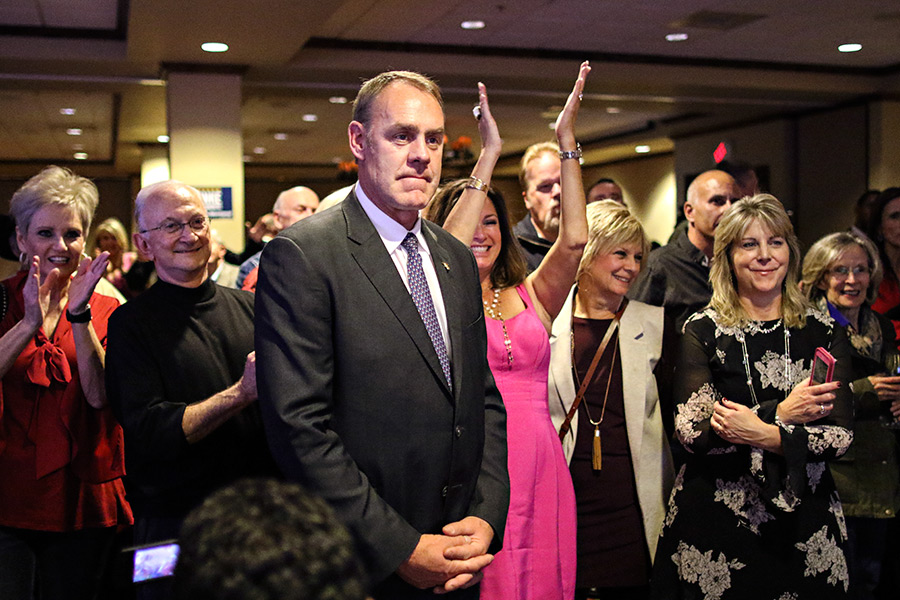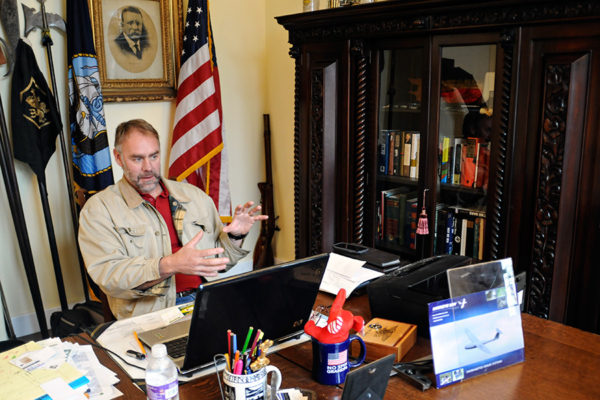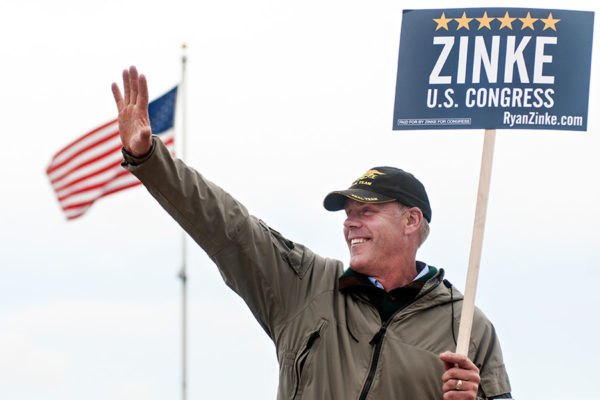The Roots of Zinke’s Rise
Congressman Ryan Zinke’s selection as interior secretary tracks an ambitious political trajectory, but supporters and critics alike hope the Whitefish native will remain true to his roots
By Tristan Scott
A decade ago, Democratic Gov. Brian Schweitzer pressed a bronze star to the dress-white lapels of a Navy SEAL commander during a ceremony at the Whitefish Lake Golf Club, a stone’s throw from where the serviceman was raised and just north of where Schweitzer farmed mint for nearly 20 years before taking office.
Both men shared close ties to Whitefish and a deep appreciation for the wide expanses of public land and soaring mountains that gird the community, and both stoked white-hot political ambitions in their bellies.
Those fires have continued to burn ever since.
In a prophetic gesture after the 2006 ceremony, the commander, a Whitefish native named Ryan Zinke who had recently returned from combat in Iraq, quipped to guests that he intended to stake out a bid for the governor’s job, multiple ceremony attendees recall.
Those political stars never aligned, but two years later, Zinke, a Republican now serving as Montana’s lone congressman in the U.S. House of Representatives and who President-elect Donald Trump recently appointed to serve as interior secretary, began his rapid ascent up the political pecking order by launching a successful bid for the Montana Senate, rolling out a blueprint for a campaign that his early advisors and friends recall as smart, principled and calculated.
Longtime Republican state legislator and former Secretary of State Bob Brown met Zinke as a teenager in 1977, while volunteering as a counselor in the American Legion Boys State, an educational program of government instruction for high school students, and recalls the gifted pupil displaying unusual statesmanship.
“He impressed me greatly,” Brown said. “Even then he was a dynamic presence — tall and impressive, smart and articulate. I think he will be an independent-thinking secretary of interior who won’t forget his Montana roots, who won’t forget where he is from. And he will provide a great public service for the state and the country.”
Before Zinke was a Congressman and an appointee to the president’s inner circle, he was a boy in Whitefish, a standout high school football player, a wrestler, and an Eagle Scout whose service project centered on studying pollutants leaching from the nearby rail yard into the Whitefish River near his boyhood home.
In his new memoir, “American Commander,” published last month, Zinke recalls how the project prompted an early interest in conservation.
“The project I chose was to follow the banks of the river and look at the sources of any pollution or runoff.
“I took pictures of the railroad’s oil holding ponds and looked at how the ponds of oil would overflow into the river. I looked at the storm drains dumping in the river, took soil samples, and proposed solutions to the degree a young student could.
“When an old logger downstream was mowing his lawn and caused a spark, which caused the river to catch on fire, I knew the source. The project promoted a lifetime of conservation values.”
Today, his commitment to those conservation values is coming under deeper scrutiny than ever before as environmental groups respond to his selection with mixed reviews. Zinke’s appointment to hold sway over the nation’s federal lands and natural resources is hailed by many as a boon for conservation and public lands in Montana and nationwide, while others are unpacking the Congressman’s checkered voting history and support for aggressive energy-exploration policies as a portent for a polluter-friendly administration led by Trump, who has pledged to roll back regulations and unleash a torrent of fossil-fuel energy production.
While Zinke broke from the pack in his first term as the lone House Republican to support preservation of the federal Land and Water Conservation Fund and opposed transferring the management of federal lands to states’ control — a view many conservationists hold with inviolable sanctity — he has also opposed a new rule to reduce the emission of the greenhouse gas methane during energy production on public land and a moratorium on new coal leasing.
He was co-sponsor of the Resilient Federal Forests Act of 2015, which environmental groups said cast aside important conservation protections and stripped citizens’ constitutional right to challenge the government in court.
The bill, which U.S. Sen. Steve Daines, R-Montana, also supported, prioritized timber harvests above all else, critics said, and opened the door for unsuitable forest management while limiting public involvement.
The League of Conservation Voters has given Zinke a 3 percent voting score on conservation policies for his first term in Congress.
But roll the clock back to 2008, when Zinke was launching his bid to represent the district of Whitefish in the Montana Legislature, and a different figure emerges.
Steve Thompson of Glacier Climate Action was a founding chairman of the Montana chapter of the League of Conservation Voters, and in 2008 the then-unknown Navy SEAL approached him seeking a pro-conservation endorsement from the organization.
Having seen other so-called “green Republicans” blanch under the pressure of elected political office and turn on their conservation values in the face of partisan pressure, Thompson expressed skepticism.
Zinke, however, assured the environmental advocate that he wasn’t one to buckle under pressure.

That election cycle, Zinke earned a rare co-endorsement from the Conservation Voters, and in 2009 he received a rating of 54 percent from the organization, the highest score of any Republican legislator that session. The following year, he bested his score with a 60 percent rating, and earned accolades in the group’s newsletter.
“Thanks to Sen. Ryan Zinke (R-Whitefish) for standing up for clean water and energy security in Montana,” the publication stated.
Conservationists viewed him as the Legislature’s most informed, responsible Republican on energy and climate. Calling climate change a national security issue, Zinke co-signed a letter to President Barack Obama and Congress in 2010 urging passage of stronger climate change legislation.
Bob Lawson represented the greater Whitefish area in House District 80 as a Republican from 1997 to 2004 and prior to that worked as assistant principal at Whitefish High School, where Zinke was a student. Lawson sat in on early strategic meetings during Zinke’s state senate run and said, in his mind, the Congressman has remained true to his roots as a self-proclaimed “Teddy Roosevelt Republican.”
“I think he is firm, fair and consistent,” Lawson said. “He has always pictured himself as a Teddy Roosevelt Republican conservationist. From the first time we ever talked about politics, that has been one of his mainstays. It’s not simply lip service. He believes in it.”
But Thompson has witnessed a shift in Zinke’s public persona and said his softening stance on climate science is evidence that he’s putting politics ahead of leadership.
Under current Interior Secretary Sally Jewell, the agency has been at the vanguard of President Obama’s efforts to curb climate change, and Thompson said the secretary’s future role should be consistent with that agenda.
“Based on what I’ve seen, I don’t know what Zinke believes in anymore,” Thompson said. “I hope we don’t see a wholesale abandonment of good climate science because it’s so critical, and I’m hopeful that he would return to his core conservation beliefs in his new prominent role.”
As a congressman, Zinke has been a staunch advocate of mining and logging on federal lands, prompting some to voice concern that he would align with Trump’s agenda to prioritize the development of oil, gas and other resources over the protection of clean water, air and wildlife. However, he has endorsed the idea of putting public lands in Park County’s Paradise Valley permanently off limits to mining.
Schweitzer remembers the freshman state legislator as a pragmatist rather than an ideologue, and as a lawmaker who spent more of his time confabbing with Democrats about Montana-made solutions than he did pandering to the leaders of his own party.
“As a state senator, he was one of those Republicans who would see me in the hall and hustle over and say, ‘Hey guv, I have an idea. Got a minute?’ And I would always invite him into my office to talk. He was clearly ambitious, but he would listen to ideas on both sides and make his own decisions,” Schweitzer said. “He was maybe the only Republican in the Senate endorsed by the Conservation Voters and he believes in the mission of public lands, which means he believes there are some places that are so special they should be owned by everybody. I haven’t heard many Republicans in Montana say those things recently, and Ryan Zinke says those things.”
Others see Zinke’s appointment, in terms of environmental stewardship, as leagues above the rest of the field that was under consideration to lead the Department of the Interior. Before Trump announced Zinke’s appointment, several names emerged as possibilities for the position that would have been far less palatable for conservation groups, according to University of Montana political science professor Rob Saldin.
Among the names that surfaced were Oklahoma Gov. Mary Fallin, former Alaska Gov. Sarah Palin, oil tycoon Forrest Lucas, former Colorado Rep. Bob Beauprez, Utah Rep. Rob Bishop, and Eastern Washington lawmaker Cathy McMorris Rodgers — all of whose environmental records raised the hackles of conservation advocates.
“I think this is kind of champagne-cork times for some of the conservation groups worried that it was going to be Sarah Palin or someone supportive of transferring public lands or an oil executive,” Saldin said. “Zinke has been a vocal advocate for protecting public land and he has put forward some aggressive policies on energy development, and I would expect him to pursue both of those channels. But when it comes to public land, he has carved out some unique territory. He has gone out on a limb by the standards of the Republican Party as a defender of public lands, and some of the other names floated out there were scary. Conservation groups should be thrilled. It could have been way worse.”
As head of the Interior, Zinke will also oversee the Bureau of Indian Affairs. Blackfeet Tribal Business Council Chairman Harry Barnes said he thought Zinke was a strong pick.
“I think it’s a great day for Montana because anytime a Montanan is picked for a position with this much responsibility, it’s a good thing,” Barnes said.
Barnes said Zinke has been a strong advocate for issues that concern the Blackfeet Tribe, specifically the recently passed Blackfeet Water Compact.
The appointment also calls into question the future of the state’s congressional makeup, and could initiate a domino effect in the halls of the state house.

Zinke was recently reelected for a second term in the U.S. House of Representatives, and had been eyeing a likely 2018 run for the U.S. Senate against incumbent Democrat Jon Tester. Assuming he is confirmed for the role of interior secretary, Zinke would vacate his Congressional seat in January, and the U.S. Constitution calls for a special election to fill the vacancy. Republicans and Democrats would present candidates, and the election would take place 85 to 105 days after the vacancy.
Numerous Republicans and Democrats are waiting in the wings as potential candidates in the rarefied race, with much of the speculation centering on Republican gubernatorial candidate Greg Gianforte as the GOP’s pick, although Gianforte’s public response has been lukewarm.
“Susan and I have appreciated the many calls of support and encouragement we have received from folks urging me to run if indeed there is a vacancy in our U.S. House seat,” Gianforte told the Beacon in an email. “But right now, like many other Montanans, I’m hoping for more snow, filling the freezer and getting ready to celebrate Christmas with my family.”
State Sen. Ed Buttrey of Great Falls has said he would run for the congressional seat, while other sources say Republican Matt Rosendale of Glendive, who was elected as Montana’s state auditor in November, will seek the nomination, although that departure would allow Democratic Gov. Steve Bullock to fill the seat and add a Democrat to the GOP-dominated state Land Board.
Selecting a Democratic candidate presents a unique set of challenges in its own right, coming on the heels of a general election in which Montanans overwhelmingly supported Trump, while splitting the ticket to reelect Bullock, leaving many to wonder who could mount a successful campaign.
“I can think of one,” Schweitzer said, referring to himself. “But I don’t know if he wants to do it.”
Three years ago, Schweitzer gained prominent national recognition as a colorful and dynamic challenge to the establishment of both political parties, and speculation about a 2016 White House run erupted.
The former governor said he’s received a torrent of inquiries about running for Zinke’s House seat, as well as polls showing he has maintained strong name recognition and favorability ratings. But he’s not convinced a seat in Congress would allow him to affect the kind of dramatic change he sees the need for.
“As one of the last elected congressmen out of 435 seats, serving in a minority party, I don’t believe that puts you in a position to so much as get a table at a restaurant in Washington, D.C., let alone change the world,” Schweitzer said. “I am not sure that would be the right direction.”
Instead, Schweitzer said he hopes someone “with fire in their belly” will step up to the plate.
“There are those sorts of people all over Montana, who have the communication skills and the passion and who know they can make the world a better place,” he said. “Let’s look for that next generation, and let’s give them a chance to make a difference.”